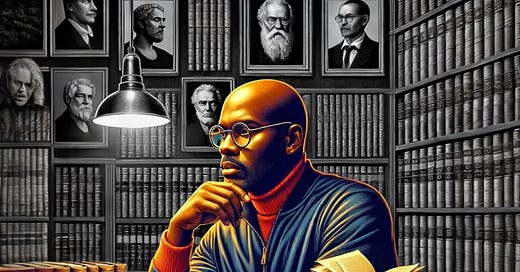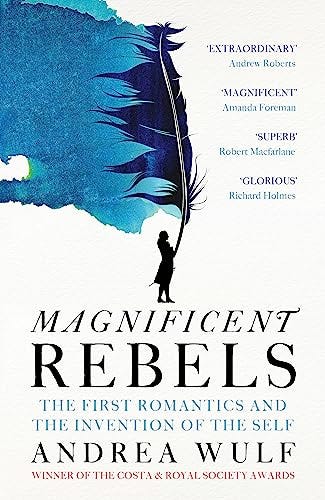A Love Affair with Philosophy Books
…..And Why I Think They’re Important For The Times We’re In
If I could travel back in time to my undergraduate years at The Ohio State University, walk up to that younger version of myself on the Oval, and whisper a simple truth in his ear, it would be this: major in philosophy.
Don’t get me wrong—my time as a sociology major was transformative. It taught me how to deconstruct systems of power, examine social structures, and understand the contours of human interaction through a macro lens. But what I didn’t realize until later in life was that I was always searching for something deeper, not just the “what” or “how” of society, but the ever-elusive why.
That’s what philosophy has given me. The why behind the systems. The why behind desire, belief, rebellion, and being. And in a world where everything seems louder, faster, more divided, and less certain by the day, I’ve come to believe that a philosophical framework is no longer a luxury for the few—it’s a lifeline for the many.
A Curious Mind Set Loose
Even during my sociology days, I remember sneaking off to the university library and spending hours devouring books I wasn’t assigned. Nietzsche, Lao Tzu, Simone de Beauvoir, Du Bois, and Hannah Arendt—they weren’t just thinkers to me, they were companions on my journey. I was a polymath in the making, though I didn’t have the vocabulary for it yet.
Over the years, I’ve allowed my polymathic curiosity to wander—sometimes toward the metaphysical, other times toward economic theory, and occasionally into the poetic. I read widely not to impress but to connect. To ideas. To people. To a deeper understanding of myself and the world around me.
That’s why, even today, my bookshelf is a jumbled, glorious mess of philosophy, social theory, Eastern wisdom, and Western doubt.
Here are three books I’m currently reading—or in some cases, joyfully re-reading—and why they matter so much to me right now:
📚Magnificent Rebels by Andrea Wulf
This book is nothing short of electric. Wulf chronicles the birth of the modern self through the explosive creative and intellectual energy of the Jena Set—Goethe, Schelling, Fichte, and the brilliant Caroline Schlegel. What struck me most wasn’t just the intellectual bravado of these early German Romantics, but how much they risked for the sake of thinking differently.
They lived with urgency, passion, and chaos, reminding me that revolutions—whether personal or political—rarely come dressed in perfection. They come when the mind is set ablaze. Wulf’s storytelling reminds me that the philosophical impulse is not dry and academic. It is daring. It is dangerous. And above all, it is human.
📚Readings in Classical Chinese Philosophy edited by Philip J. Ivanhoe and Bryan W. Van Norden
This book is a portal into the wisdom traditions that continue to shape my inner and outer life. From Confucius’s call to virtue and ritual to Zhuangzi’s hilarious, mind-bending meditations on freedom, I find a kind of clarity here that no Western philosophy textbook ever gave me.
Chinese philosophy doesn’t ask you to debate for debate’s sake—it asks you to live differently. It challenges your attachment to identity, logic, and permanence. It invites you to become water, to flow with what is, and to find integrity not through resistance but through alignment. In today’s high-conflict, high-anxiety world, this feels not only refreshing—it feels essential.
📚The History of Philosophy by A.C. Grayling
Grayling’s ambitious work attempts to do the impossible—tell the story of human thought across millennia in a single sweeping volume. While the task itself is Herculean, what I love most about this book is how Grayling weaves connections between East and West, classical and modern, theological and secular.
It reminds me that philosophy has never belonged to a single culture or era. From the rationalism of Descartes to the insights of Buddhist epistemology, the project of philosophy has always been the same: to make sense of this strange, beautiful, maddening experience of being human.
My Bookcrumbs On Why We Should All Be Reading Philosophy Now
🔥It Sharpens Your Inner Compass
In an era where truth is increasingly up for grabs, philosophy reminds us how to think, not just what to think. It gives us tools to cut through noise and reconnect with first principles.
🔥It Cultivates Resilience
Reading Stoicism or Taoism isn’t just intellectual—it’s practical. These schools of thought prepare the mind for suffering, change, and impermanence with dignity and grace.
🔥It Fosters Empathy
To read philosophy is to walk through the minds of others—sometimes radically different from others. It’s an act of perspective-taking, a softening of the ego.
🔥It Disrupts The Status Quo
Philosophy has always been about questioning assumptions. It’s a radical act in a time when conformity masquerades as consensus.
🔥It Helps You Live Deliberately
Whether it’s Socrates saying “the unexamined life is not worth living” or the Buddha urging us to awaken, philosophy calls us not to drift—but to choose. To live awake.
👇
So yes, if I had to do it over, I’d walk out of that sociology building and into the philosophy department, eyes wide, heart open, ready to swim in deeper waters.
But then again, maybe it happened just as it should. Maybe the detour was the path. Because the truth is, I didn’t just major in sociology, I majored in curiosity. And philosophy, at its best, is nothing if not the art of curiosity refined.
So I’ll keep reading. Keep wandering. Keep asking. Because in these confusing, contradictory times, I don’t think the world needs more certainty. I think it needs more people willing to wrestle with the questions.
And I, for one, am here for the wrestling.
If you are finding “Great Books, Great Minds” to be a valuable resource in your polymathic reading journey, then we invite you to join us as a paid member supporter. Or feel free to tip me some coffeehouse love (dirty chai’s are my jam) here if you feel so inclined.
Your contributions are appreciated!
Every bit counts as I strive to deliver high quality feature articles into your inbox on a regular basis. Never any paywalls, just the opportunity to foster community, connection, and conversation one book at a time.







Hey I really love this Diamond. I also never majored in Philosophy during college but felt myself always gravitating towards books by Nietzsche, Camus, Hesse.. Finally took a class in critical theory and it just absolutely blew my mind.
I also was absolutely not aware of the word polymath until I read this piece! I used to think I was a jack of all trades and struggled with finding a specific niche. Now I have a new word to describe myself and I’m finally comfortable owning the fact that I’m into a lot of different things :)
Diamond---I appreciate your sharing more about this very philosophical side of yourself. Polymathic is a new word for me.